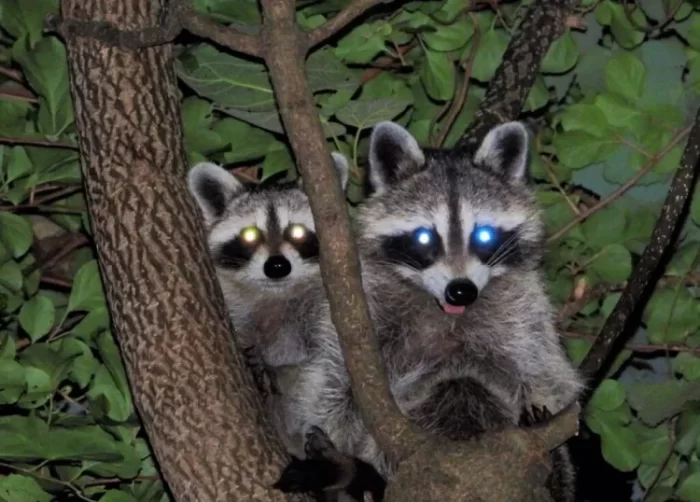Yes! Raccoons are able to climb trees in order to rest safely during the day. They can climb up and down trees if their roosting spot is disturbed.
Raccoons are nocturnal creatures but if hungry enough, one might turn up in your backyard. Here in the States, they are unwelcomed guests.
Table of Contents
Can Raccoons Climb Trees? Why Do Raccoons Climb Trees?
Raccoons can climb trees to reach other places such as rooftops. They also climb trees to escape predators such as dogs, coyotes, etc.
I once saw a raccoon climb a tree to reach birds’ nests. So, yeah, raccoons can and will invade a nesting birds nest to steal eggs or eat baby birds.
These are some of the reasons raccoons may be seen climbing trees.
ALSO SEE: Can Racoons kill Dogs?
Do Raccoons Live in Trees?
Of course! Raccoons might live alone or in groups in trees. They love small, dark, and enclosed spaces that provide enough room for them and their families, while still keeping them safe from predators.
Trees are an ideal solution for this. They may decide to live in tree trunks or in dense areas that offer a reliable shelter.
How Can You Tell If Your Trees Have Raccoons?
You’ll notice:
- A raccoon climbing a tree on your property.
- Scratches on the tree from their sharp claws
- Raccoon poop around your trees or in other outdoor areas, such as your deck or patio.
You may also find them indoors in areas such as attics or garages. Raccoon scat is recognizable by its pungent odor and dark, tubular appearance.

Why are Raccoons in Your Trees A Problem?
Their excrement may contain dangerous parasites, such as giardia or roundworms. This is especially dangerous for young kids; it can make them sick.
Also, if your trees have branches that extend over your roof, these animals can use them as a way to climb onto your home, crawl into the attic and wreak havoc (chewing wires and starting a fire).
Lastly, raccoons can cause a great disturbance while you are trying to sleep during their nocturnal activities.
How To Stop Raccoons From Climbing Trees
The most effective means of stopping raccoons from climbing up trees is to wrap various materials around the tree trunk from where it meets the ground.
This prevents raccoons from accessing the base of the tree in order to climb it.
You should buy a conical tree guard or use 3 feet or sheet metal. An alternative is to wrap three lengths of porcupine wire around the base of the trunk in a spiral reaching nine feet up the tree.
At first thought, it may seem like doing too much but these pesky critters are smart and the way to beat them is to think waaaay ahead and do EXTRA.
But what if they have already made a home in the tree? What can I do then? see the next section of this article.
How To Get Rid Of Raccoons In Your Trees
From experience, raccoons particularly love old trees because of their hollow trunks. Tall ones feature an escape route that is far out of reach for predators. Plus, the branches offer access to other places for food or exploration.
Here are a few more ideas that are commonly suggested, and why they may or may not work.
Purchase coyote urine from Amazon and use it. Alternatively, any urine other natural raccoon predators will work.
You simply sprinkle this around tree. This will work until the coyotes realize that there are no coyotes in the area.
These critters are quick learners.
Humane traps will work well too. Once caught, you transport the raccoon away from your home to a new land or area.
Although live trapping may be an effective means of controlling coon spread, it may not be 100% successful every time, especially if the raccoon has babies.
A parent will be especially motivated to find its way back to the nest.
Devices like sprinklers and lights might work in scaring away the raccoon. Thereby discouraging it and forcing it to seek a home elsewhere.
Raccoons generally avoid spicy substances such as chili.
See also Can Racoon Be Eaten? How to Cook it!
So, diluting it to spray around the area can deter raccoons as they will prefer not to risk contact with their skin.
Food is one of the attractants of raccoons into your yard. So, by getting rid of food sources such as pet food, trash, etc., raccoons will be willing to find a more advantageous home.
If neighbors are willing to help with the same measures, this can drive raccoons out of the immediate area as they search for a home that is near food.
ALSO SEE: Can I Keep Pet Raccoons?
Do Raccoons Nest in Trees?
Yes, they can. Trees are great areas for raccoons to birth, nurture, and raise their young.
They prefer hollow trees with entrances high up the trunk since this is out of reach of most predators that may pose a threat to their young ones.
Once the young babies are of age and ready to begin exploring, trees also offer opportunities for play and practicing the important skill of climbing. Plus, trees are an excellent base for young raccoons to return to if they find themselves in danger.
Where do Raccoons Live During The Day?
Raccoons live in their nests during the day. They rest in their nests when the sun is up.
Do Raccoons Sleep in Trees During The Day?
A raccoon and its family can sleep in trees during the day. It is quite common for raccoons to make safe haven in trees. That is where they spend most of their sleeping hours.
Raccoons normally sleep in the daytime, although they are sometimes active during the day.
Why Do Raccoons Climb Trees At Night?
They climb a tree at night for safety, food, and exercise.
Do Raccoons Live In Groups?
Although raccoons can be lone animals, they work best when they choose to stay in groups. Being part of a group helps them survive against the harsh elements, increase chances of getting food when they hunt and help protect them from other predators.
Can Raccoons Get Stuck in Trees?
Yes, raccoons sometimes may find themselves stuck in trees. However, because you find a raccoon up a tree does not mean they can’t climb down.
They can climb up and down on their own with no issues at all.
Despite this, it is possible for a raccoon to become stuck in a tree, so it is a good idea to keep an eye on how long a raccoon has been up there. If it has stayed in the same place for more than a day, this may show that it needs help getting down.
See also How Can You Tell How Old a Baby Raccoon Is? [Secret Shared]
Can Racoons Climb Down Trees?
Yes! Raccoons are able to climb any size tree forward or backward or even headfirst down a tree.
What Trees do Raccoons Prefer?
Raccoons have no preference when it comes to trees. They will usually nest in ones that offer the most protection.
Do Raccoons Live in Palm Trees?
Yes, a raccoon may choose to live in palm trees, sometimes.
It becomes more appealing if it has thick frond “skirts” that could conceal raccoons from sight.
You can keep raccoons out of palm trees by wrapping the base, trapping, using pepper or motion-activated devices, or removing resources.
Cutting away the frond skirt may be a possibility.
Do Raccoons Live In Pine Trees?
The palm tree is another favourite nesting ground for raccoons. Raccoons love them for their height, large trunks, and tree hollows.
You may need to cut back any branches that raccoons can use to get to the other places.
Do Raccoons Live in Fruit Trees & How to Keep Them Out of Fruit Trees?
Raccoons love eating sweet fruit and may decide to live in the tree if it has sturdy structures that can shelter them. Whether they live in the tree or only stop by to eat the fruit, raccoons can be a nuisance for fruit-growers.
Branches should be removed from within three feet of the ground. After this, it is recommended to add a sheet metal collar to the base and trunk of the tree.
Do Raccoons Live in Tree Holes?
Raccoons can be found in hollow trees and tree holes.
They love dark places that make them feel safe, secure, and enclosed.
Raccoons are only likely to settle into a tree hole if they have food sources nearby. Besides trees, they also make their dens in many other places, such as in attics, under fallen logs, and in dense brush.
Do Raccoons Sleep in The Same Place Every Night?
Raccoons are nocturnal creatures so they do not sleep at night, but will sleep at the same pace during the day until it becomes unsuitable for them.
Raccoons are clever and persistent but understanding how they behave will go a long way in making sure they aren’t comfortable in your garden, home, or yard.
The strategies shared here or a combination of the solutions here will help keep your trees raccoon-free.

With over 5+ years of experience in pest control and a PhD in Entomology, our author brings a blend of scientific knowledge and practical expertise to Pestifier.com. Passionate about creating pest-free environments, they provide effective tips and strategies for managing and preventing pest infestations. Connect on Facebook for the latest updates and insights.

